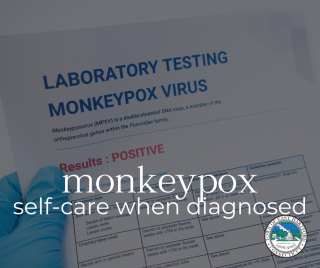Self-Care When Diagnosed With Monkeypox

Individuals who think they have monkeypox (MPX) or have had close personal contact with someone who has been diagnosed with MPX should visit a healthcare provider to help them decide if they need to be tested for the virus. If a healthcare provider decides that you should be tested, they will work with you to collect the specimens and send them to a laboratory for testing. Individuals should only get tested for monkeypox if they are currently experiencing symptoms.
If someone told you that you have been exposed to MPX, residents are encouraged contact the East Hartford Health Department at 860-291-7324 to assist with vaccine options and availability, which may prevent you from developing severe symptoms.
If you have been diagnosed with MPX and currently have sores, are experiencing pain, issues with using the bathroom (bowel movements and peeing), or other discomfort, you can ask a healthcare provider for TPOXX, an antiviral medication that helps reduce severe symptoms. Here’s how to do that:
- Let your provider know that the CDC recently updated guidance on July 22, 2022 to make TPOXX medication much easier to access. Share this link with them, as the guidance recently changed and they may not be up-to-date.
- Providers can fill out the required EA-IND forms after you begin treatment.
- Virtual appointments are allowed to get prescriptions for TPOXX.
Isolation and Prevention Practices for People with Monkeypox
CDC recommends that people with monkeypox (MPX) remain isolated at home or at another location for the duration of illness, but that might not be possible in all situations. Prioritizing isolation and source control strategies helps prevent further transmission of the virus.
Current data suggest people can spread MPX from the time symptoms start until all symptoms have resolved, including full healing of the rash with formation of a fresh layer of skin. Ideally, people with monkeypox should remain in isolation for the duration of illness, which typically lasts two to four weeks. However, if a person with MPX is unable to remain fully isolated throughout the duration of the illness, they should do the following:
- While symptomatic with a fever or any respiratory symptoms, including sore throat, nasal congestion, or cough, remain isolated in the home and away from others unless it is necessary to see a healthcare provider or for an emergency.
- This includes avoiding close or physical contact with other people and animals.
- Cover the lesions, wear a well-fitting mask (more information below), and avoid public transportation when leaving the home as required for medical care or an emergency.
- While a rash persists but in the absence of a fever or respiratory symptoms
- Cover all parts of the rash with clothing, gloves, and/or bandages.
- Wear a well-fitting mask to prevent the wearer from spreading oral and respiratory secretions when interacting with others until the rash and all other symptoms have resolved.
- Masks should fit closely on the face without any gaps along the edges or around the nose and be comfortable when worn properly over the nose and mouth.
- Until all signs and symptoms of monkeypox illness have fully resolved
- Do not share items that have been worn or handled with other people or animals. Launder or disinfect items that have been worn or handled and surfaces that have been touched by a lesion.
- Avoid close physical contact, including sexual and/or close intimate contact, with other people.
- Avoid sharing utensils or cups. Items should be cleaned and disinfected before use by others.
- Avoid crowds and congregate settings.
- Wash hands often with soap and water or use an alcohol-based hand sanitizer, especially after direct contact with the rash.
For questions regarding monkeypox vaccine availability, treatment options, or assistance with isolation, please contact the East Hartford Health Department at 860-291-7324.

